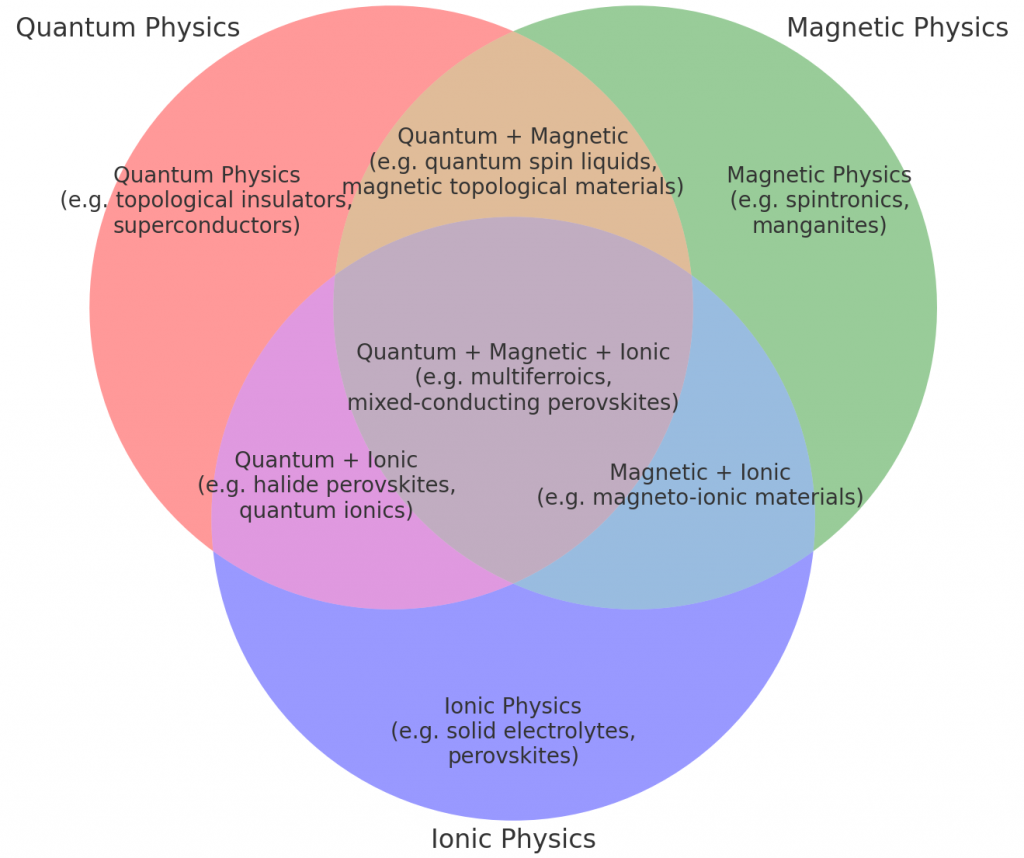Chairman: Dr. Adam Badra Cahaya
The year 2025 has been officially declared by UNESCO as the International Year of Quantum Science and Technology, recognizing the transformative impact of quantum science on modern society and its foundational role in future technologies. In alignment with this global initiative, the Quantum, Magnetic, and Ionic Physics Research Group (QuMI-Phys Group) was established based on Universitas Indonesia Rector’s Regulation No. 6 of 2025 concerning Research Groups/Laboratories at Universitas Indonesia. This initiative aims to optimize research, which serves as a foundational pillar in the development of science and technology.
This research group represents a collaboration of faculty members actively engaged in the field of Condensed Matter and Materials Physics, combining experimental, theoretical, and computational approaches. The group focuses on exploring the rich interplay between quantum phenomena, magnetic interactions, and ionic transport mechanisms in solid-state materials.
Quantum, magnetic, and ionic physics all play crucial roles in solid-state devices, impacting their functionality and design. Quantum mechanics is fundamental for understanding the behavior of electrons and their interactions within materials, while magnetism influences materials’ magnetic properties and their interaction with magnetic fields. Ionic physics, lastly, governs the motion and behavior of ions within materials, particularly in devices like batteries and sensors.
are recommended to have good grade in the following compulsory course:
- Introduction to Solid State Physics (Pendahuluan Fisika Zat Padat)
- Introduction to Materials Science (Pendahuluan Ilmu Material)
- Characterization Methods of Material (Metode Karakterisasi Material)
- Thermodynamics of Materials (Termodinamika Material)
- Capita Selecta on Advanced Material (Kapita Selekta Material Maju)
- Magnetism (Kemagnetan)
- Spectroscopy A & B (Spektroskopi A & B)
- Solid State Ionics (Fisika Zat Padat Ionik)
- Computation of Materials (Komputasi Material)
- Nonrelativistic Quantum Field Theory (Teori Medan Kuantum Nonrelativistik)
may pursue appropriate programs, based on their background and career options (each program also has “by research path” option focusing on research)
Compulsory courses in by course path of Master Program in Materials Science includes:
- Structure Material
- Material Properties and Performance
- Thermodynamics and Material Kinetics
- Characterization and Material Analysis
Compulsory courses in by course path of Master Program in Physics, includes:
- Computational Methods and Mathematics
- Physics Methodology
- Integrated Science and Mathematics
may pursue appropriate programs, based on their background and career options (each program also has “by research path” option focusing on research)
Compulsory courses in by course path of Doctoral Program in Material Science includes:
- Scientific Literacy
- Advanced Material Structure
- Philosophy of Science
- Advanced Material Properties and Performance
- Integrated Science and Mathematics
- Advance Material Characterization and Analysis
- Advanced Thermodynamics and Kinetics of Materials
Compulsory courses in by course path of Doctoral Program in Physics includes:
- Integrated Science and Mathematics
- Research Methodology
- Capita Selecta Physics A & B
- Philosophy of Science and Literature Review
- Scientific Writing
Quantum mechanics explains how electrons move and interact within solid materials, including phenomena like electron transport, band structure, and the formation of quantum wells and dots. Quantum mechanics is essential for designing and understanding quantum devices like quantum dots, which can be used for quantum computing, sensing, and optical applications. Our research interest focuses on developing theoretical explanations of transport, magnetic, and optical properties of strongly correlated electron systems. (Former Theoretical/Computational Condensed Matter Physics lab)
Magnetism plays a pivotal role in the design of materials for data storage, spintronic devices, and precision sensing technologies. This area focuses on computational modeling of magnetization dynamics, micromagnetics, and magnetic interactions in ferromagnetic and composite materials. By employing numerical simulations and data-driven approaches, we investigate spin transport, domain formation, and magnetization reversal mechanisms that underlie advanced magnetic materials and devices.
(Former Micromagnetic Laboratory)
Understanding magnetism at the experimental level is crucial for developing materials and devices that exploit magnetic properties for technological applications. This area investigates magnetic characterization, material synthesis, and experimental magnetometry, focusing on ferromagnetic, ferrimagnetic, and nanostructured systems. Our work includes exploring magnetoresistance, coercivity, and spin-dependent transport in magnetic thin films and bulk materials, providing the experimental validation for theoretical and computational predictions. (former magnetic materials and characterization labs)
Ionic physics governs the movement of ions through solid electrolytes, including materials such as perovskite oxides and halides, which are essential for energy storage and transduction applications. Understanding ionic conductivity is crucial for designing and optimizing devices like batteries, fuel cells, and ionic sensors.
Request for characterization is available via https://material-scope.id/
(former UPP-IPD research lab)
.
Dr. Nur Ika Puji Ayu
Research Grants (Hibah Penelitian)
- Hibah Direktorat Penelitian dan Pengabdian kepada Masyarakat, Kemenristekdikti
- D. Triyono, PPS-PTM: Inovasi Substrat Perovskite BFO untuk Deteksi Rhodamine B dengan Teknik SERS yang Sensitif dan non-Timbal
- D. Triyono, PPS-PTM: Teknik SERS Perovskite Berbasis LaFeO3-Emas: Solusi Ramah Lingkungan untuk Pemantauan Residu Pestisida yang Sensitif dan Stabil
- D. Triyono, PFR: Inovasi Teknologi Sensor Gas Respon Cepat Berbasis Perovskite untuk Monitoring Emisi CO2
- Hibah Universitas Indonesia:
- A.B.Cahaya, PUTI Q1: Kajian Stabilitas Struktur Nano dari Quantum Dot
- M.A.Majidi, PUTI Q1: Studi Plasmon Terkorelasi dalam Sistem Cuprates melalui Pemodelan Hubbard pada Sistem Kisi 2D yang Dipecahkan dengan
Metode Dynamical Mean-Field Theory - S. Aji, PUTI Q1: Photo-Induced Magnetic Phase Transitions in Nontrivial Spin Textures
- B. Kurniawan, PUTI Q1: Eksplorasi Peran Vacancy pada Ion Ca2+ terhadap Struktur, Sifat Magnetik, dan Magnetocaloric Effect, Senyawa La0.7Ca0.2-xSr0.1MnO3 melalui XRD, MPMS, Difraksi Neutron dan XAS
- N.I.P.Ayu, PUTI Q1; Hydrides-ion Conductor for the Next Generation Hydrides-ionBattery
- D. Djuhana, PUTI Q2: Investigasi Nanostruktur, Sifat Magnetik, Simulasi Mikromagnetik dan Performa Penyerapan Radar Nanohibrida MOFe2O3-(CH3CH2)2NH/Grafit/ZnO
Journal Publications
- A.B. Cahaya, Zitterbewegung, momentum, and spin dynamics of electromagnetic waves in a linear dielectric medium, Phys. Rev. A 112, 033721.
- A.B. Cahaya, Spin current compensation from competing magnon modes in ferrimagnets, Journal of Physics D: Applied Physics 58, 345002.
- S Ramandhany, E Sugiarti, D Triyono, N Latifah, AS Wismogroho, H Izzuddin, AA, Jayadi, MW Ahdi, AP El Nasihah, Masruroh, K Aini,
- S Aji, MAN Azhiim, NIP Ayu, AB Cahaya, K Kusakabe, MA Majidi, “Spin current generation driven by skyrmion dynamics under magnetic anisotropy and polarized microwaves”, Journal of Physics D: Applied Physics 58, 315003












 English
English